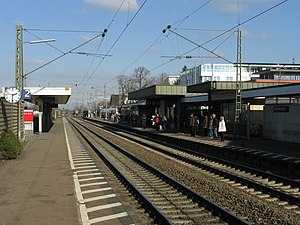Bad Krozingen station
| Through station | |
 View of platforms 1 and 2 (2015) | |
| Location | Bahnhofstr. 2, Bad Krozingen Germany |
| Coordinates | 47°55′11″N 7°41′53″E / 47.9197413°N 7.69806594°ECoordinates: 47°55′11″N 7°41′53″E / 47.9197413°N 7.69806594°E |
| Line(s) |
|
| Tracks | 2 |
| Other information | |
| Station code | 297 |
| DS100 code | RURB[1] |
| IBNR | 8005990 |
| Category | 4[1] |
| Fare zone | : B[2] |
| Website | www.bahnhof.de |
| History | |
| Opened | 1847 |
| Location | |
 Bad Krozingen Location in Baden-Württemberg | |
Bad Krozingen station is the most important station in the spa town of Bad Krozingen. It is located on the Rhine Valley Railway (Rheintalbahn) and the Bad Krozingen–Münstertal railway, which has started here since 1894.[3]
Infrastructure[]
Platforms[]
The station on the Rhine Valley Railway (Staatsbahnhof or state station) has always had two platform tracks with side platforms, with platform 1 next to the station building. Next to the northwestern platform 2, there was formerly a goods shed, also with a side platform, on a loading track. It was demolished after the abandonment of freight handling. On platform 2 there was also a mechanical interlocking, which has also been demolished. North of the passenger stations there were sidings and passing tracks. The connection to the Münstertal line used to be in this area, but it was removed in 2014.
The trains of the branch line terminate northeast of the entrance building next to platform 1. The platform is referred to as "platform 12". At the end of the line there was originally a turntable, which was replaced in the mid-1930s with a set of points. Its sidings were a little further north beside the tracks of the state railway. In 1977, the tracks were rebuilt to allow journeys from Münstertal to Freiburg (and vice versa), requiring trains to reverse in the station.[4]
Entrance building[]
The former station building was a two-story masonry construction with a single-storey annex. The modern entrance building was built in 1977.[4]
History[]
The station was opened in 1847 with the Rhine Valley Railway.[5] The branch line from the station to Sulzburg was opened on 20 December 1894. The operations on the line were taken over by the German Railway Operating Company (Deutsche Eisenbahn-Betriebs-Gesellschaft, DEBG) from the initial operator, Vering & Waechter, on 31 March 1899. On 1 May 1916 this line was extended to Münstertal. Since 1963, the Südwestdeutsche Verkehrs-Aktiengesellschaft (Southwest German Transport Company, SWEG) has been responsible for the operation of this branch line.[6]
The Rhine Valley Railway was electrified through the station in 1955. The railway to Sulzburg was closed in 1973 after passenger services had been replaced by buses in 1969. The line to Munster was upgraded and electrified in 2013.[6]
Bad Krozingen was regular served by express trains until the end of the 1980s. So, for instance, in the 1987 timetable, two pairs of trains ran on the Freiburg–Schaffhausen–Munich route and a pair of trains ran on the Basel–Saarbrücken route. Furthermore, each connected with a service to Ludwigshafen and Offenburg.[7]
Rail services[]
The following services stopped at Bad Krozingen in December 2015.
| Service | Route | Frequency |
|---|---|---|
| IC 60 | Basel Bad Bf – Bad Krozingen – Freiburg – Karlsruhe – Stuttgart – Munich | One train pair |
| RE | (Offenburg – Lahr (Schwarzw) – Emmendingen –) Freiburg – Schallstadt – Bad Krozingen – Müllheim (Baden) – Weil am Rhein – Basel Bad Bf (– Basel SBB) | Hourly |
| RB | (Karlsruhe –) Offenburg – Lahr (Schwarzw) – Emmendingen – Freiburg – Ebringen – Schallstadt – Bad Krozingen – Heitersheim – Müllheim (Baden) – Neuenburg (Baden) / Basel Bad Bf | Hourly with gaps |
| SWEG | (Freiburg –) Bad Krozingen – Oberkrozingen – Staufen – Münstertal | Half-hourly |
There are additional services in the peak hour.
In addition, the station is also served by several bus lines.
Notes[]
- ^ a b Eisenbahnatlas Deutschland (German railway atlas) (2009/2010 ed.). Schweers + Wall. 2009. ISBN 978-3-89494-139-0.
- ^ "Tarifzonenplan mit Übergangsbereichen" (PDF). . December 2020. Retrieved 9 February 2021.
- ^ "Bahnhof Bad Krozingen" (in German). Seite Südbaden. Retrieved 20 March 2016.
- ^ a b Gerd Wolff, Hans-Dieter Menges (1992). Deutsche Klein- und Privatbahnen (in German). Vol. 2: Baden. Freiburg: EK-Verlag. p. 364. ISBN 3-88255-653-6.
- ^ "History" (in German). Municipality of Bad Krozingen. Archived from the original on 2015-06-24. Retrieved 20 March 2016.
- ^ a b "Verkehrsbetrieb Breisgau-Staufen" (in German). Südwestdeutsche Verkehrs-Aktiengesellschaft. Retrieved 20 March 2016.
- ^ "1987 timetable for Bad Krozingen" (in German). Datenbank Fernverkehr. Retrieved 20 March 2016.
References[]
| Wikimedia Commons has media related to Bahnhof Bad Krozingen. |
- Gerd Wolff, Hans-Dieter Menges (1992). Deutsche Klein- und Privatbahnen (in German). Vol. 2: Baden. Freiburg: EK-Verlag. pp. 363–374. ISBN 3-88255-653-6.
- Railway stations in Baden-Württemberg
- Railway stations in Germany opened in 1847
- 1847 establishments in Baden
- Buildings and structures in Breisgau-Hochschwarzwald
- Mannheim–Karlsruhe–Basel railway


